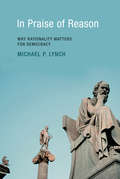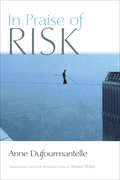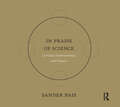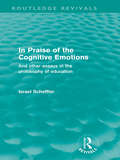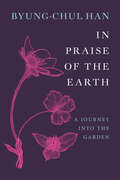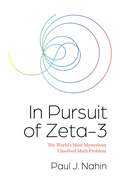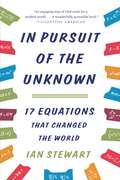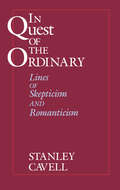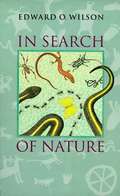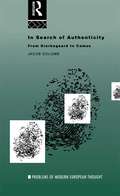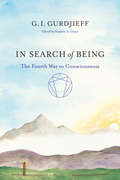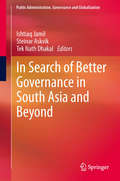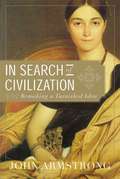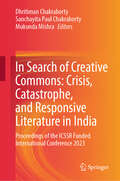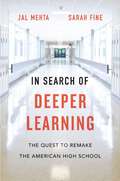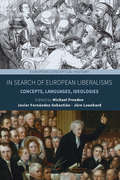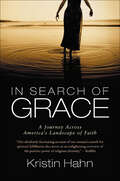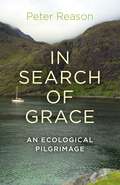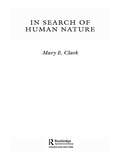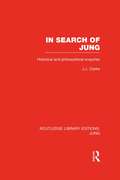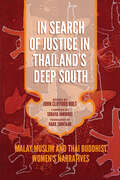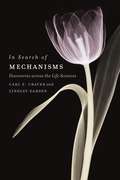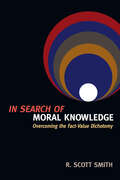- Table View
- List View
In Praise of Reason: Why Rationality Matters for Democracy (The\mit Press Ser.)
by Michael P. LynchA spirited defense of the relevance of reason for an era of popular skepticism over such matters as climate change, vaccines, and evolution.Why does reason matter, if (as many people seem to think) in the end everything comes down to blind faith or gut instinct? Why not just go with what you believe even if it contradicts the evidence? Why bother with rational explanation when name-calling, manipulation, and force are so much more effective in our current cultural and political landscape? Michael Lynch's In Praise of Reason offers a spirited defense of reason and rationality in an era of widespread skepticism—when, for example, people reject scientific evidence about such matters as evolution, climate change, and vaccines when it doesn't jibe with their beliefs and opinions.In recent years, skepticism about the practical value of reason has emerged even within the scientific academy. Many philosophers and psychologists claim that the reasons we give for our most deeply held views are often little more than rationalizations of our prior convictions. In Praise of Reason gives us a counterargument. Although skeptical questions about reason have a deep and interesting history, they can be answered. In particular, appeals to scientific principles of rationality are part of the essential common currency of any civil democratic society. The idea that everything is arbitrary—that reason has no more weight than blind faith—undermines a key principle of a civil society: that we owe our fellow citizens explanations for what we do. Reason matters—not just for the noble ideal of truth, but for the everyday world in which we live.
In Praise of Risk
by Anne DufourmantelleA philosophical critique of how society encourages us to avoid risk when we should instead accept it. When Anne Dufourmantelle drowned in a heroic attempt to save two children caught in rough seas, obituaries around the world rarely failed to recall that she authored In Praise of Risk, implying that her death confirmed the ancient adage that to philosophize is to learn how to die. Now available in English, this magnificent book indeed offers a trenchant critique of the psychic work that the modern world devotes to avoiding risk. Yet this is not a book on how to die but on how to live. For Dufourmantelle, risk entails an encounter not with an external threat to life but with something hidden in life that conditions our approach to such ordinary risks as disobedience, passion, addiction, leaving family, and solitude. Keeping jargon to a minimum, Dufourmantelle weaves philosophical reflections together with clinical case histories. The everyday fears, traumas, and resistances that therapy addresses brush up against such broader concerns as terrorism, insurance, addiction, artistic creation, and political revolution. Taking up a project than joins the work of many French thinkers, such as Jacques Lacan, Jacques Derrida, Jean-Luc Nancy, Hélène Cixous, Giorgio Agamben, and Catherine Malabou, Dufourmantelle works to dislodge Western philosophy, psychoanalysis, ethics, and politics from the redemptive logic of sacrifice. She discovers the kernel of a future beyond annihilation where one might least expect to find it, hidden in the unconscious. In an era defined by enhanced security measures, border walls, trigger warnings, and endless litigation, Dufourmantelle&’s masterwork provides a much-needed celebration of the risks that define what it means to live.Praise for In Praise of Risk&“Dufourmantelle&’s beautiful book places us on the side of life and love, showing us the power of psychoanalytic reflection on those moments when we are asked to find the courage to risk ourselves on behalf of the other.&” —Jamieson Webster, author of Conversion Disorder&“Magisterial. Dufourmantelle shows how life is universalized in risk and how recognizing this fact means enlisting in a fraternity among humans.&” —Antonio Negri&“This very rich book will have enormous appeal for readers interested in the intersection of philosophy, psychology, psychoanalysis, and humanistic inquiry. It productively challenges the assumptions of all these disciplines in novel ways and offers, in the final analysis, a redemptive path through that which matters to us most: living and dying well. Highly recommended.&” —Choice
In Praise of Science: Curiosity, Understanding, and Progress
by Sander BaisIn this engaging, lyrical book, physicist Sander Bais shows how science can liberate us from our cultural straitjacket of prejudice and intolerance. We're living in a time in which technology is taken for granted, yet belief in such standard scientific facts as evolution is actually decreasing. How is it possible for cell phones and Creationism to coexist? Science—fundamental, fact-based knowledge, not the latest technological gadget—can give us the global and local perspectives we need to make the world a better place. Bais argues that turning points in the history of science have been accompanied by similar milestones in social change, deeply affecting our view of nature, our perception of the human condition, and our understanding of the universe and our place in it. After a lively description of how curiosity trumps prejudice and pseudoscience in matters ranging from lightning rods to the transmission of HIV, Bais considers what drives science and scientists, a quest that culminates in that miraculous mixture of creativity and ingenuity found in the greatest scientists. He describes what he calls the circle of science—the microcosm and the macrocosm as mirror images—and demonstrates unity in a dazzling sequence of topics, including the hierarchy of structures, the forces of nature, cosmological evolution, and the challenge of complexity. Finally, Bais takes on the obstacles science encounters in a world dominated by short-term political and economic interests. Science, he says, needs to get its message out. Drawing on sources that range from Charles Darwin and Karl Popper to Herbert Marcuse and Richard Feynman, with In Praise of Science, Bais does just that.Copublished with MIT Press, United States of America.
In Praise of the Cognitive Emotions: And Other Essays in the Philosophy of Education (Routledge Revivals)
by Israel SchefflerFirst published in 1991, In Praise of Cognitive Emotions comprises fourteen of Scheffler's most recent essays – all of which challenge contemporary notions of education and rationality. While defending the ideal of rationality, he insists that rationality not be identified with a mental faculty or a mechanism of inference but taken rather as the capactity to grasp principles and purposes and to evaluate them in the light of relevant reasons. Examining a broad range of issues – from computers in school to math education, from metaphor to morality – these essays are unified by Scheffler's conviction of the primacy of critical thought in education. Scheffler is especially concerned to promote a broad interpretation of rationality to counteract the narrowing of vision accompanying the technological revolution now sweeping education. Addressing three specific areas of curriculum, the work offers a critique of computer applications to education, develops a notion of strategic rationality in understanding mathematical reasoning, and, contrary to prevalent notions of moral education, connects reason with care, thus emphasizing the intimate connection between emotion and reason and challenging the dominant perception of the two as oppositional.
In Praise of the Earth: A Journey into the Garden
by Byung-Chul HanThe earth is not a dead, mute landscape but an eloquent, living being. Sometimes it just takes a spade, a packet of seeds, and a pair of sturdy boots to realize it. The philosopher Byung-Chul Han spent three springs, summers, autumns, and winters in his secret garden in Berlin, devoting himself to daily gardening in all weathers. For Han, gardening is a form of silent meditation, a lingering in stillness. It gives you a different sense of time. Every plant has its own time that is specific to it, and the garden is a space in which these multiple temporalities overlap and cut across one another. The longer he worked in the garden, the more respect he developed for the earth and for its enchanting beauty. Gardening taught him what care for others means. Each organism has its own consciousness of time passing; each organism lives in its own micro-universe. Step by step, Han receded from himself and the world, moving closer and closer to an exuberant, divine nature which we are increasingly in danger of losing. Through this rich meditation on plants, soil, gardening, and time, Han unfolds a way of relating to and tending the earth that is in sharp contrast to the brutal, incessant exploitation of our planet that we see all around us today.
In Pursuit of Zeta-3: The World's Most Mysterious Unsolved Math Problem
by Paul J. NahinAn engrossing look at the history and importance of a centuries-old but still unanswered math problemFor centuries, mathematicians the world over have tried, and failed, to solve the zeta-3 problem. Math genius Leonhard Euler attempted it in the 1700s and came up short. The straightforward puzzle considers if there exists a simple symbolic formula for the following: 1+(1/2)^3+(1/3)^3+(1/4)^3+. . . . But why is this issue—the sum of the reciprocals of the positive integers cubed—so important? With In Pursuit of Zeta-3, popular math writer Paul Nahin investigates the history and significance of this mathematical conundrum.Drawing on detailed examples, historical anecdotes, and even occasionally poetry, Nahin sheds light on the richness of the nature of zeta-3. He shows its intimate connections to the Riemann hypothesis, another mathematical mystery that has stumped mathematicians for nearly two centuries. He looks at its links with Euler’s achievements and explores the modern research area of Euler sums, where zeta-3 occurs frequently. An exact solution to the zeta-3 question wouldn’t simply satisfy pure mathematical interest: it would have critical ramifications for applications in physics and engineering, such as quantum electrodynamics. Challenge problems with detailed solutions and MATLAB code are included at the end of each of the book’s sections.Detailing the trials and tribulations of mathematicians who have approached one of the field’s great unsolved riddles, In Pursuit of Zeta-3 will tantalize curious math enthusiasts everywhere.
In Pursuit of the Unknown: 17 Equations That Changed the World
by Ian StewartFor general readers of science and technology titles, this engaging work on the meaning and impact of mathematical equations examines seventeen of the most important equations in history and explores not only the science behind the specific formulas, but also the wide influence of these germinal ideas on modern technologies and scientific study. Covering popular equations such as the Pythagorean theorem and Relativity, as well as more obscure and advanced topics, the work provides an entertaining journey through the development of theoretical mathematics, as well as an informative look at applied science. Numerous tables, graphs, and illustrations are provided throughout. Stewart is professor emeritus of mathematics at Warwick University. Annotation ©2012 Book News, Inc. , Portland, OR (booknews. com)
In Quest of the Ordinary: Lines of Skepticism and Romanticism
by Stanley CavellThese lectures by one of the most influential and original philosophers of the twentieth century constitute a sustained argument for the philosophical basis of romanticism, particularly in its American rendering. Through his examination of such authors as Emerson, Thoreau, Poe, Wordsworth, and Coleridge, Stanley Cavell shows that romanticism and American transcendentalism represent a serious philosophical response to the challenge of skepticism that underlies the writings of Wittgenstein and Austin on ordinary language.
In Quest of the Ordinary: Lines of Skepticism and Romanticism
by Stanley CavellThese lectures by one of the most influential and original philosophers of the twentieth century constitute a sustained argument for the philosophical basis of romanticism, particularly in its American rendering. Through his examination of such authors as Emerson, Thoreau, Poe, Wordsworth, and Coleridge, Stanley Cavell shows that romanticism and American transcendentalism represent a serious philosophical response to the challenge of skepticism that underlies the writings of Wittgenstein and Austin on ordinary language.
In Search Of Nature
by Edward O. WilsonDefinitely philisophical in nature. A scientist/philosophers view of life, nature etc. Not casual reading.
In Search of Authenticity: Existentialism from Kierkegaard to Camus (Problems of Modern European Thought)
by Jacob GolombGreat philosophers such as Kierkegaard, Nietzsche and Sartre have clearly been preoccupied by the possibility of authenticity. In this study, Jacob Golomb looks closely at the literature and writings of these philosophers in his analysis of their ethics. Golomb's writings shows his passionate commitment to the quest for the authenticity - particularly in our climate of post-modern scepticism. He argues that existentialism is all the more pertinent and relevant today when set against the general disillusionment which characterises the late twentieth century. This book is invaluable reading for those who have been fascinated by figures like Camus's Meursault, Sartre's Matthieu and Nietzsche's Zarathustra.
In Search of Being
by G. I. GurdjieffAre we able to say that life is governed by a group of conscious people? Where are they? Who are they? We see exactly the opposite: that life is governed by those who are the least conscious, by those who are most asleep. Provocative ideas such as these have attracted generations of thoughtful people to the methods of self-study and inner work devised by Gurdjieff, one of the most radical spiritual teachers of modern times. According to Gurdjieff, the wars raging at this very moment are nothing more than millions of sleeping people trying to annihilate millions of other sleeping people. Contrary to popular belief, there is no such as thing as progress and evolution as long as humanity remains asleep. Two hundred conscious people could change the whole of life on the earth, Gurdjieff says. If we want to become those conscious people, we must learn how to change ourselves. With the help of self-knowledge and an understanding of our relation to the universe, we can awaken to a higher level of being--if we wish to change ourselves. All of Gurdjieff's fundamental principles and methods of transforming the intellect, emotions, and body, in the system known as the Fourth Way, are presented in this book in his own clear, precise words preserved by his closest pupils. Arranged in an orderly sequence of passages drawn from two primary source books--P. D. Ouspensky's In Search of the Miraculous, and Views from the Real World, edited by Mme. Jeanne de Salzmann--this material is an indispensable introduction for those determined to undertake the efforts and practices necessary for awakening consciousness. All the basic concepts and methods are covered, including: * man is "asleep" * we have no unified "I" * the need for self-knowledge * functions of the human "machine" * states of consciousness * levels of being * three centers: moving, emotional, and thinking * personality and essence * the possibility of self-development * self-observation * remembering oneself * conscious evolution * the law of three forces * the ray of creation * the law of octaves * the Enneagram, a universal symbol * the variety of spiritual ways * esoteric Christianity * working in groups * the necessity of schools
In Search of Being: The Fourth Way to Consciousness
by G. I. GurdjieffOver one hundred years ago in Russia, G. I. Gurdjieff introduced a spiritual teaching of conscious evolution—a way of gnosis or &“knowledge of being&” passed on from remote antiquity. Gurdjieff&’s early talks in Europe were published in the form of chronological fragments preserved by his close followers P. D. Ouspensky and Jeanne de Salzmann. Now these teachings are presented as a comprehensive whole, covering a variety of subjects including states of consciousness, methods of self-study, spiritual work in groups, laws of the cosmos, and the universal symbol known as the Enneagram. Gurdjieff respected traditional religious practices, which he regarded as falling into three general categories or &“ways&”: the Way of the Fakir, related to mastery of the physical body; the Way of the Monk, based on faith and feeling; and the Way of the Yogi, which focuses on development of the mind. He presented his teaching as a &“Fourth Way&” that integrates these three aspects into a single path of self-knowledge. The principles are laid out as a way of knowing and experiencing an awakened level of being that must be verified for oneself.
In Search of Better Governance in South Asia and Beyond
by Ishtiaq Jamil Tek Nath Dhakal Steinar AskvikThe pursuit for better governance has assumed center stage in developmental discourse as well as reform initiatives of all organizations working for the public welfare, and includes such issues as service delivery and responding to citizens' needs and demands. In the era of globalization, multilevel and new modes of governance are changing the traditional governance models of nation states, accelerated by technological innovation, rising citizen expectation, policy intervention from international and multilateral donor communities, and the hegemony of western ideology imposed on many developing nations. However, a universally accepted and agreed upon definition of 'governance' still remains elusive. There is no consensus or agreement as to what would be the nature and form of governance and public administration. The question that is raised: Is there a universal governance mechanism that fits in all contexts or governance mechanisms should be based on home grown ideas?One can see various programs and policies of reforms and reorganizations in public administration in the developing countries, but these efforts have not been effective to address the challenging issues of economic development, employment generation, poverty reduction, ensuring equality of access to public services, maintaining fairness and equity, security and safety of citizens, social cohesion, democratic institution building, ensuring broader participation in the decision making process, and improving the quality of life. Therefore, there is a widespread concern for better governance or sound governance to bridge the gap between theory and practice, making this book of interest to academics as well as policy-makers in global public administration.
In Search of Civilization: Remaking a Tarnished Idea
by John Armstrong"A self-effacing, humane and unparanoid call to change our wealthy yet often barbaric world for the better." * In this provocative cri de coeur, the philosopher John Armstrong rescues the idea of civilization from irrelevance and connects it to our search for individual happiness. "Civilization" once referred to a society's technological prowess, its political development, or its cultural achievement. In the modern era, however, the word became burdened by the legacy of colonialism and connotations of elitism. For it to have value once again, according to Armstrong, we must understand that a society balances material prosperity with spiritual prosperity if it is to merit the term "civilized"—and currently we are impoverished. In Search of Civilization is his corrective. As he roams from anecdote to aesthetic appreciation—from the banality of an early job at an insurance company to the redemptive wonders of a seventeenth-century church spire visible out an office window, from Adam Smith's philosophy to the Japanese tea ceremony—Armstrong reminds us that culture lies within us and that its nourishment is essential to a flourishing society.
In Search of Creative Commons: Proceedings of the ICSSR Funded International Conference 2023
by Mukunda Mishra Dhritiman Chakraborty Sanchayita Paul ChakrabortyThis book contains selected papers presented at the international conference titled 'In Search of Creative Commons: Crisis, Catastrophe, and Responsive Literature in India', held at the Abid Ali Khan Centre for Digital Archive and Translation of Cultures, Gour Mahavidyalaya (College) from 31 August to 2 September, 2023 in collaboration with the Department of English, Dr. Meghnad Saha College. The conference was funded by the Indian Council of Social Science Research (ICSSR). In this book, three basic questions are considered. First, as humans try to live in-and-through catastrophes and exceptional situations in the contemporary world, what new perspective can literature as a creative form offer for healing and restorative purposes? Second, what new idioms and narrative styles, massive crises such as famine, partition, migration, the decimation of forests, rivers, and the disappearance of villages held up in creative articulations in colonial and postcolonial times in India? Can these representations be called “responsive literature”? Further, and this is the third major contention of this book, how can responsive literature be thought of as a conceptual category? What new transdisciplinary optic should be adopted to go beyond the limits of the “literary” and eventually include the “non-literary”? The objective of these discussions was to contribute to the larger discursive literature on disaster studies, which we believe has been excessively hegemonized by concepts from the West. By bringing in indigenous ideas from Bhasa Sahitya (language and literature), the images of samaj (society), samata (equity), and ahimsa (non-violence), the existing literature on catastrophe and crisis studies can finally be decolonized.
In Search of Deeper Learning: The Quest to Remake the American High School
by Jal MehtaAn award-winning professor and an accomplished educator, Jal Mehta and Sarah Fine take us beyond the hype of reform and inside some of America’s most innovative classrooms to show what is working—and what isn’t. In a world where test scores have been king, this boldly humanistic book offers a rich account of what education can be at its best.
In Search of European Liberalisms: Concepts, Languages, Ideologies (European Conceptual History #6)
by Michael Freeden Javier Fernández-Sebastián Jörn LeonhardSince the Enlightenment, liberalism as a concept has been foundational for European identity and politics, even as it has been increasingly interrogated and contested. This comprehensive study takes a fresh look at the diverse understandings and interpretations of the idea of liberalism in Europe, encompassing not just the familiar movements, doctrines, and political parties that fall under the heading of “liberal” but also the intertwined historical currents of thought behind them. Here we find not an abstract, universalized liberalism, but a complex and overlapping configuration of liberalisms tied to diverse linguistic, temporal, and political contexts.
In Search of Grace: A Journey Across America's Landscape of Faith
by Kristin HahnAfter years as a Hollywood writer and filmmaker, Kristin Hahn felt a crisis of faith: she had no spiritual group she could call her own. Setting out on a three-year journey, she began an investigation of America's religious traditions, practices, and beliefs.Crisscrossing the nation, Hahn spent a week cloistered in prayer with convent nuns and a month of Ramadan fasting with Muslims. She went door-to-door with young Mormon missionaries and head-to-head with turbaned Sikh yogis. She sat through marathon meditations with Buddhist masters and spent days in conversation and ceremony with an 0jibwe medicine man. Her explorations exposed her to the rich, ancient culture of the Jews and brought her into the enclaves of Christian Scientists and Amish farmers, as well as the less traditional realms of Scientology, neopagan witchcraft, and the congregations of new-age gurus.And this was only the beginning.Openhearted, humorous, and always thoughtful, In Search of Grace offers nourishment for our spiritual hunger -- and a myriad of ways to find a religious home.
In Search of Grace: An Ecological Pilgrimage
by Peter ReasonTo recover from ecological disaster, we humans must transform the sense of who we are in relation to the Earth. In Search of Grace is the story of an ecological pilgrimage undertaken by the author in his small yacht, Coral, from the south of England and round the west coast of Ireland, to the far north of Scotland. It explores themes of pilgrimage: the overall pattern of separation from the everyday, venturing forth, and returning home. It tells of meeting wildlife, visiting sacred places, confronting danger, expanding and deepening the experience of time, of silence and of fragility.
In Search of Human Nature
by Mary E. ClarkHuman Nature offers a wide-ranging and holistic view of human nature from all perspectives: scientific, historical, and sociological. Mary Clark takes the most recent data from a dozen or more fields, and works it together with clarifying anecdotes and thought-provoking images to challenge conventional Western beliefs with hopeful new insights. Balancing the theories of cutting-edge neuroscience with the insights of primitive mythologies, Mary Clark provides down-to-earth suggestions for peacefully resolving global problems. Human Nature builds up a coherent, and above all positive, picture of who we really are.
In Search of Jung: Historical and Philosophical Enquiries (Routledge Library Editions: Jung)
by J. J. ClarkeIs Jung one of the most exciting and important thinkers of our age? Or is he just a dabbler in the occult and oriental mysticism? Although Jung has enjoyed wide popularity over time, he is still not accorded an appropriately honoured place in the history of modern thought. His interest in Oriental thought, alchemy and astrology has alienated many and he is often marginalized by scholars and academics. Originally published in 1992, this book aimed to rectify this state of affairs by showing that Jung was an important thinker in his own right and that his ideas play an important role at the heart of the intellectual debates of our age. The book explores Jung’s relationship with some of the great philosophical thinkers and movements such as Hegel, Nietzsche and existentialism, examines his links with the revolutionary ideas of modern physics and argues that his conception of the human psyche represents an important contribution to perennial questions about mind, human nature and human destiny.
In Search of Justice in Thailand’s Deep South: Malay Muslim and Thai Buddhist Women’s Narratives (Studies in Religion and Culture)
by Soraya JamjureeSince 2004, the violent conflict between Thai Buddhists and Malay Muslims has caused more than 7,500 deaths and 13,000 injuries in the southern border provinces of Thailand. This will be the first collection published in English to give voice to those who have rebounded from these profound personal tragedies to demand justice and peace.The ethnic and religious separatist insurgency in the southern provinces of Thailand is complex. Ninety to ninety-five percent of Thai citizens are Buddhists. In the southernmost provinces, however, Muslims are in the majority—yet they are governed by the Buddhist Thai capital in the north. In 2006 and 2014, the Thai government went through separate coups, resulting in differing policies to address this problem in the south, including a National Culture Act to promote "Thai-ness" throughout the country. In the south, this has resulted in a repressive and corrupt police force and military raids on Muslim villages, provoking the burning of schools and other symbols of Thai government, bombings, and even the killing of teachers and monks.The narratives collected here, primarily from women, testify that although the violence has been generated from both sides of the Buddhist/Muslim divide, the actions undertaken by armed forces of the Thai Buddhist state—including repressive violence and torture—have served as a catalyst for increased Muslim insurgency. These contributions reveal the fundamental problem of how a minority people can fully belong within a state that has insisted on religious, cultural, and linguistic homogenization.
In Search of Mechanisms: Discoveries across the Life Sciences
by Carl F. Craver Lindley DardenNeuroscientists investigate the mechanisms of spatial memory. Molecular biologists study the mechanisms of protein synthesis and the myriad mechanisms of gene regulation. Ecologists study nutrient cycling mechanisms and their devastating imbalances in estuaries such as the Chesapeake Bay. In fact, much of biology and its history involves biologists constructing, evaluating, and revising their understanding of mechanisms. With In Search of Mechanisms, Carl F. Craver and Lindley Darden offer both a descriptive and an instructional account of how biologists discover mechanisms. Drawing on examples from across the life sciences and through the centuries, Craver and Darden compile an impressive toolbox of strategies that biologists have used and will use again to reveal the mechanisms that produce, underlie, or maintain the phenomena characteristic of living things. They discuss the questions that figure in the search for mechanisms, characterizing the experimental, observational, and conceptual considerations used to answer them, all the while providing examples from the history of biology to highlight the kinds of evidence and reasoning strategies employed to assess mechanisms. At a deeper level, Craver and Darden pose a systematic view of what biology is, of how biology makes progress, of how biological discoveries are and might be made, and of why knowledge of biological mechanisms is important for the future of the human species.
In Search of Moral Knowledge: Overcoming the Fact-Value Dichotomy
by R. Scott SmithFor most of the church's history, people have seen Christian ethics as normative and universally applicable. Recently, however, this view has been lost, thanks to naturalism and relativism. R. Scott Smith argues that Christians need to overcome Kant's fact-value dichotomy and recover the possibility of genuine moral and theological knowledge.
